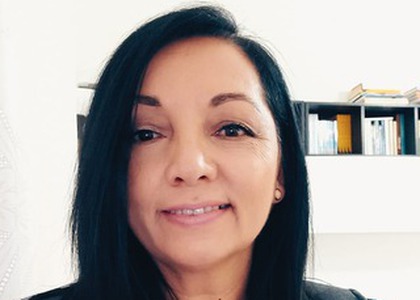> Interviews

Interview with Prof. Simona Moldoveanu, “Arpeggio” choir’s conductor from Rome
The vocal group "Arpeggio" from Rome is celebrating 10 years since their first appearance on stage with a special Christmas concert on Tuesday, December 10th, at the Santa Maria Church in Campitelli, Rome. Joining the invited artists is the writer Chivuța Iordache who will recite poems from her volume "My flower bouquet", and Simona Fabiola Gîrneață will be the event's moderator. Simona Moldoveanu, the choir's conductor, has given us more details in her conversation with our colleague, Ioana Țintea.
Looking back, Ms Simona Moldoveanu, how did the musical story Arpeggio come to be? What inspired you to establish this vocal group?
The Arpeggio story started 10 years ago, when five girls who wished to sing in a choir, being former choir singers, reunited and began rehearsing to create a choir repertoire driven by the desire to know more and promote Romanian choir music in Rome.
This year's Christmas concert is special, marking a decade of artistic activity for the Arpeggio vocal group. Can you tell us more about the theme and schedule of the "Between Heaven and Earth" concert?
The event's theme is, of course, Christmas. Now we are celebrating coming back on the stage for Christmas, and if 10 years ago we had a relatively small repertoire, now it's bigger than ever. The concert is called "Between Heaven and Earth" because we have decided to create a unique musical experience, a journey that combines the Christmas traditions and today's Christians' references to Romanian customs in this time.
During the first part, we will perform Acappella concerts from the Romanian repertoire, Romanian concerts inspired by the Bethlehem scene, where the star and the magi become symbols for soul searching. Then, during the second part, only the musicians will perform a small instrumental concert of international sacred music.
We'll be joined by musicians that we have been collaborating with for more than three years: Benedetta Castellani on violin, Ana Maria Dumitrache on panpipe, and the maestro Gian Luigi Zampieri on organ. The maestro Gian Luigi Zampieri is an Italian orchestra conductor who reached out to us three years ago to perform the Christmas concert together. He found us online and we have been collaborating ever since. He will also be by our side during this big celebration.
Lastly, in the third part, these musicians will join the Arpeggio choir and together we will perform four pieces from the international Christmas repertoire. And then, as the title implies, we return to the earth, and during the last part, we will perform a carol choir suite by Achim Stoia, which describes Christmas the way it is seen in Romania.
What message do you have for all of the people who will come to the concert and for the Romanian community in Rome?
To the Romanian community in Rome, who I'm certain is very excited to meet with us again and celebrate Christmas together in the heart of Rome as we have for the past 10 years, I want to wish them "Merry Christmas" and invite them to join us on December 10th, at 7:30 PM, at the Santa Maria Church in Campitelli, where the Arpeggio choir performs at least three concerts every year.
I would also like to mention that all of our activities, including this concert, will take place under the patronage of the Romanian Embassy in the Italian Republic, the Romanian Embassy to the Holy See and the Sovereign Military Order of Malta, and the Academia di Romania, and, last but not least, also of the National Choral Association of Romania, with who we are in close contact and through which we participate in different choir festivals in Romania.
As media partners, Radio Romania News, and Radio Romania International, I thank you from the bottom of my heart for inviting us to talk about our celebration.
Translated by Elisabeta Cristina Ungureanu,
University of Bucharest, Faculty of Foreign Languages and Literatures, MTTLC, year I
Corrected by Silvia Petrescu














